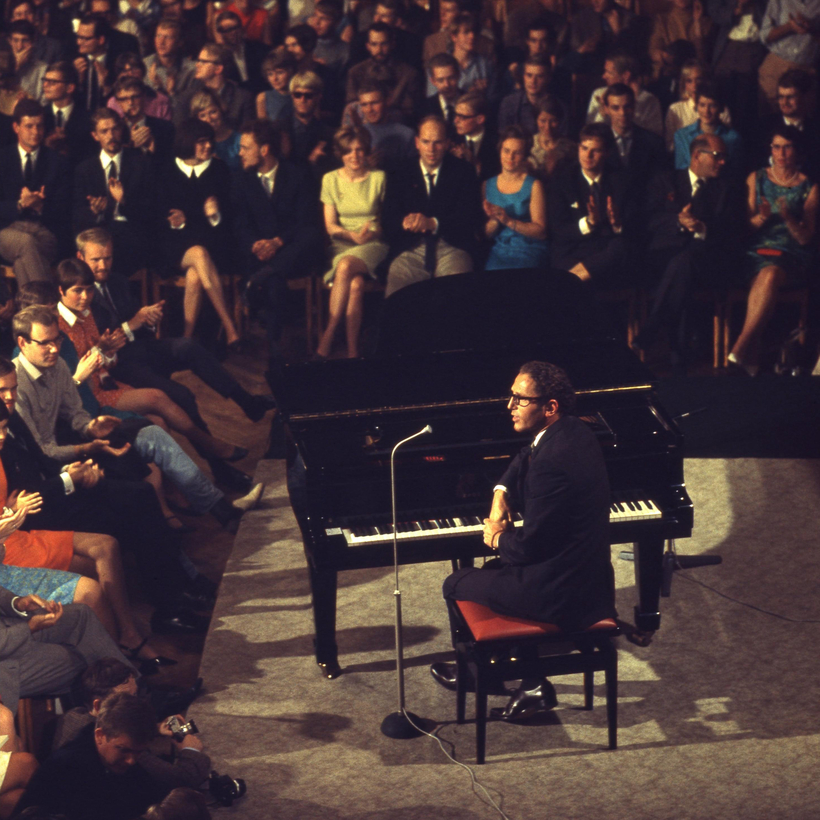Tom Lehrer delighted in following a Web site that predicted the exact day of his death and kept changing it according to an algorithm. He checked it regularly.
Last week, Lehrer died, at 97, in the tiny graduate-student house in Harvard Square he bought in the 1960s and never saw any need to change even as he gained enduring international fame for his matchlessly mordant songs. It had ridiculously narrow and dangerously steep stairs, with a too-low ground-floor clearance for anyone his height. Miraculously, he never fell down those steps, or the ones to the basement, where he kept hundreds of books and CDs, all dedicated to musical theater and the songs of the 20th century.
He broke his hip walking home from a weekly lunch with friends in the Square, as it’s called, and reluctantly had a stairlift installed, but he didn’t use it, pointing out that going up and down the stairs (there was only one bath, on the second floor) was the only exercise he got most days. A helper looked in for a few hours two days a week. And that was all the help he would accept. His mind was intact to the end, and he could and did recite reams of lyrics from failed shows of the 40s through the 70s simply to make a point that came up in conversation.
I first met Lehrer in the early 1990s at an annual sing-along at the home of Dorothy Zinberg, a Cambridge salonnière and professor who befriended Lehrer when she engaged him to tutor her in math while she was earning her Ph.D. He became part of her family, which included her husband, Norman Zinberg, a charismatic psychoanalyst and pioneer in both the science of addiction and treating H.I.V. patients when no one else would. Both before and after he was a Supreme Court justice, Stephen Breyer was a regular, reciting with Lehrer the intricate patter songs of a shared hero, Danny Kaye. I caught Lehrer’s attention because I knew all the verses to Noël Coward’s “Mad About the Boy,” and a decades-long friendship and correspondence began.
I’d revered his work from my early teenage years, the ideal time to discover his subversive, skewering humor. He’d also attended the Loomis Chaffee School, graduating at age 15 to enter Harvard. At my wedding, he was stunned to meet a woman who’d been in the chorus behind him when he played the Pirate King in The Pirates of Penzance, his “last performance on any stage as an actor.” We’d trade Loomis notes, particularly over the still-scandalous roman à clef that the gay postwar novelist John Horne Burns, author of The Gallery, about wartime Naples, wrote about the school; he’d marked one of the copies of Lucifer with a Book, still banned from the Loomis library in our day, with the names of the real-life models.
His father, Morris, was a tie designer, manufacturer, and distributor whose town house on East 70th Street in Manhattan was “the lap of luxury,” according to Lehrer’s stepsister and fan, Louise Grunwald. “There was a cook and a couple of maids. It was grand living. It was interesting that Tom maintained such a spartan lifestyle.”

Although he continually poked fun at his friend Dorothy Zinberg for collecting well-known people, he did enjoy recounting several stories of his own brushes with fame. For instance, about the fact that then newcomers Nichols and May opened for him—not the other way around—at the Blue Angel, in 1954. “You know Leonard Bernstein’s father’s famous remark: ‘How did I know he’d grow up to be Leonard Bernstein?’ How did I know that this guy Mike Nichols was going to become what he became?” he said. “If I had known he was going to be this great director, I would’ve asked him for tips on how to make my act better.”
Bernstein himself, a fellow Harvard man, once told Lehrer, “Princess Margaret just played your record for me.” Later, upon meeting Princess Margaret, Lehrer asked whether her sister Her Majesty had heard the album. “She said that HM hated it and would leave the room if they put it on,” he told me. “How’s that for a royal name-drop!”
At one of John Kenneth Galbraith’s annual Harvard-commencement garden parties, the host had asked Lehrer to play his “Vatican Rag” (“Ave Maria / Gee it’s good to see ya”). When Galbraith brought Jacqueline Kennedy over to meet him, Lehrer opened by asking if she was perhaps offended by the tune. “Offended?” she asked. “I’ve been waiting all my life for a song like that.” Then a grandee broke into their conversation, looking past Mrs. Kennedy to exclaim, “Tom Lehrer! I’ve always wanted to meet you!”
But his priorities were the writers he admired and the songs he wrote. He particularly esteemed Sheldon Harnick, whose 1950 song “The Merry Minuet” (“They’re rioting in Africa, they’re starving in Spain,” popularized by the Kingston Trio), which people wrongly assumed he wrote, gave him the opening to write the songs he wanted to. In 2010, Harnick and Lehrer M.C.’d a memorable evening of comedy songs at the 92nd Street Y, during one of Lehrer’s last trips to New York City.
Lehrer’s “no-contest favorite musical” was She Loves Me, written by Harnick and Jerry Bock two years before Fiddler on the Roof. He preferred student productions over professional ones, because of the pure, unpolished quality of talent that allowed him to see and hear the work itself, and maintained that the best Guys and Dolls he ever saw was at a high school near Arlington, Massachusetts. At U.C. Santa Cruz, he taught a course on musical theater that ended in a concert version of a musical he’d choose, cast, and accompany on the piano; his diabolically witty quizzes circulated in the musical-theater world like samizdat.
Zinberg, who’d experienced Lehrer’s mathematics tutoring, said that his talent for teaching rivaled his talent for writing and performance. She tried to convince WGBH to film his classes as they had those of her neighbor and friend Julia Child, but he characteristically declined.
His library of biographies of songwriters was immense, as was his range of CDs, LPs, and sheet music by the large baby grand in his narrow living room, and in recent years he would invite me to take whatever I wanted, adding, “This offer expires when I do.”

He treasured his friendship and collaboration with the songwriter Joe Raposo, who convinced Lehrer to write songs for the children’s-television program The Electric Company, including “Silent E.” During their collaboration, from 1971 to 1973, Raposo asked Lehrer to stay at his Upper West Side apartment a bit longer before going to dinner, to hear a song he’d just written for Sesame Street. Decades later, Lehrer would almost tear up remembering how simple and beautiful “Sing” was—close to perfect, he thought.
He naturally revered Stephen Sondheim, who had overlapped with him at summer camp, though they didn’t remember each other, and whom he placed in “the top tier” of Broadway lyricists. He once told Dorothy Zinberg that he hoped to outlive Sondheim so that he wouldn’t miss anything he wrote. He remarked that Sondheim, whose death in 2021 was announced the day after Thanksgiving, “certainly contradicted the old showbiz adage: Don’t die on Friday.”
Fans constantly wrote him—his address and number remained listed, though he seldom answered the phone—but, he complained, “they always want something,” generally an autograph. “I’m always supposed to give them something—who writes offering something to me?” He would recall one memorable exception: a couple from Pennsylvania who sent a mug emblazoned in gothic font with I Got it From Agnes, the title of a song about an unspecified S.T.D. that made endless rounds, a song whose performance he took pains to discourage during the AIDS crisis, though he proudly kept the mug in his cupboard. (A 16-year-old Grunwald, who would listen to his act twice a night at the Blue Angel during a Christmas vacation and was enthralled that he’d immortalized a “Louise” as one of the named vectors, told me she kept asking her mother, “What is it?” Her mother thought for a moment and said, “A cold.”)

He did assent to the request of Cullen Murphy for an autographed first page of the music to “the Vatican Rag,” and when I reported that Murphy had framed and hung it in a place of honor, Lehrer replied, “Drat! I should have charged him.” Fans would sometimes show up at his doorstep, and occasionally, as in the case of comedian Alex Edelman, he would invite them in. More often, however, he would reply with a version of this form letter, from 2022: “Thank you for your letter. I must inform you, however, that I am 94 years old and have neither the time nor the energy to write the reply your letter deserves.” Earlier this year, he stopped sending even that. It felt like a liberation, he said.
For someone ferociously unsentimental, he was an extremely loving and loyal friend. When I wrote to propose dinner, he’d reply with the subject header “GOODY” or “Yippee.” Whether or not he meant it, it’s an example to emulate. We would frequently need to reschedule meetings because of weekly lunches he would have with old friends or other friends coming from out of town to see him, people he’d known for years, whose intellects and originality he admired.
His last e-mail to me, a few weeks after his 97th birthday, on April 7 (“So far, 97 feels exactly like 96”), was titled “Still not dead.” I hoped that would always be true.
Corby Kummer is the executive director of the Aspen Institute’s Food & Society program. A senior editor at The Atlantic, he is also the author of several books, including The Pleasures of Slow Food: Celebrating Authentic Traditions, Flavors, and Recipes


